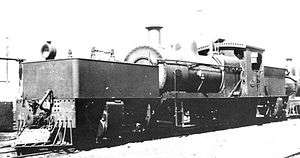WAGR Ec class
|
Ec249 at Kellerberrin on the Eastern Goldfields Railway in 1903 | |||||||||||||||||||||
| |||||||||||||||||||||
| |||||||||||||||||||||
| |||||||||||||||||||||
| |||||||||||||||||||||
The WAGR Ec class was a class of 4-6-2 heavy passenger and goods Vauclain compound locomotives operated by the Western Australian Government Railways (WAGR) between 1901 and 1958.[1]
History
A total of 20 Ec class engines were built by Baldwin Locomotive Works, Philadelphia, in the first half of 1901, and entered service with the WAGR later that year.[2][3] The following year, Baldwin built the first of two batches of the C class, a lighter version of the Ec class.[4]
Initially, the Ec class' main task was to haul heavy trains on the Eastern Goldfields Railway. Between 1920 and 1923, nine Ec class engines were lightened for use on the lightly laid Northam to Mullewa line, and reclassified as the Eca class.[3][5]
All 20 were withdrawn between 1923 and 1925, with the frames, wheels, cabs and tenders married with new boilers, cylinders and valve gear at Midland Railway Workshops to become the L class. The costs of the rebuilds were recovered within four years through lower maintenance costs.[3][5]
By the early 1930s, frame cracks were beginning to appear with 14 receiving new frames. They were replaced in the 1950s by the W class.[3][5][6][7]
See also
References
Notes
- ↑ Gunsburg 1984, pp. 69, 71.
- ↑ Gunsburg 1984, p. 69.
- 1 2 3 4 Oberg, Leon (2010). Locomotives of Australia 1850s-2010. Dural: Rosenberg Publishing. pp. 112–113. ISBN 9781921719011.
- ↑ Gunsburg 1984, p. 72.
- 1 2 3 Turner, Jim (1997). Australian Steam Locomotives 1896-1958. Kenthurst: Kangaroo Press. pp. 27, 89. ISBN 086417778X.
- ↑ Gunsburg 1984, pp. 69-71.
- ↑ Gunzburg 1984, pp. 100–101.
Cited works
- Gunzburg, Adrian (1984). A History of WAGR Steam Locomotives. Perth: Australian Railway Historical Society (Western Australian Division). ISBN 0959969039.
External links
![]() Media related to WAGR Ec class at Wikimedia Commons
Media related to WAGR Ec class at Wikimedia Commons
![]() Media related to WAGR L class at Wikimedia Commons
Media related to WAGR L class at Wikimedia Commons
| |||||||||||||||||||||||||||||||||||||


